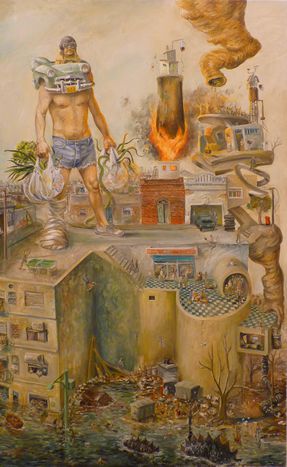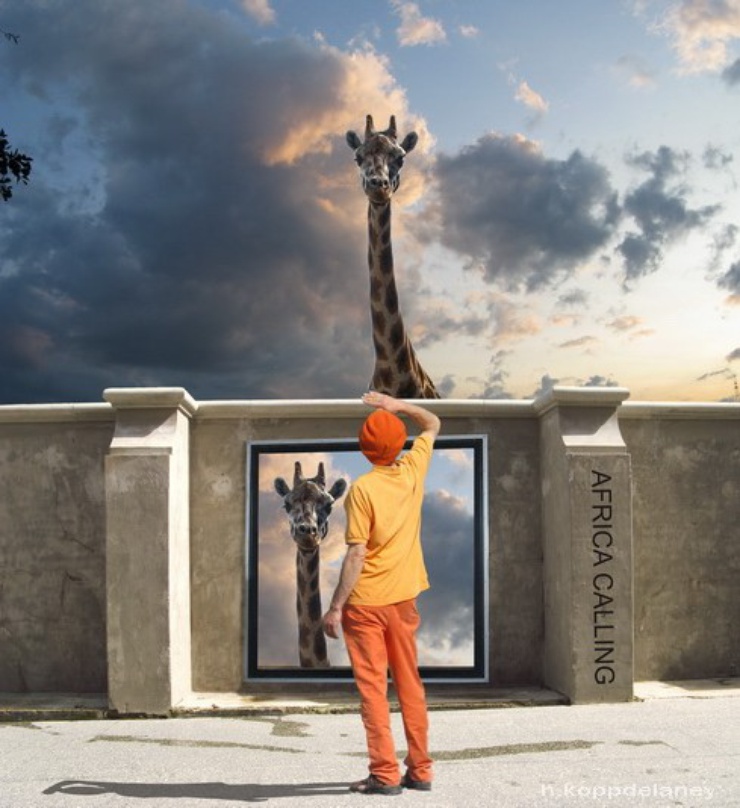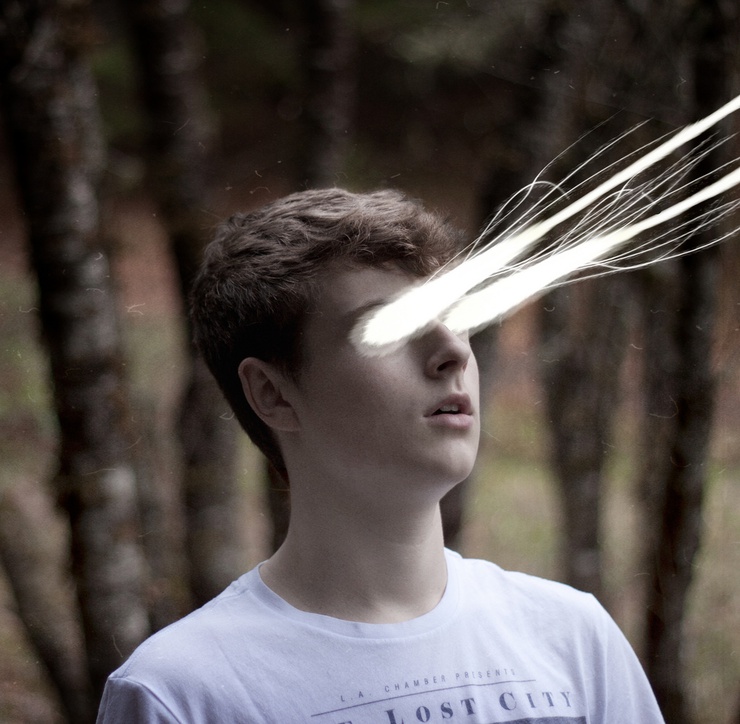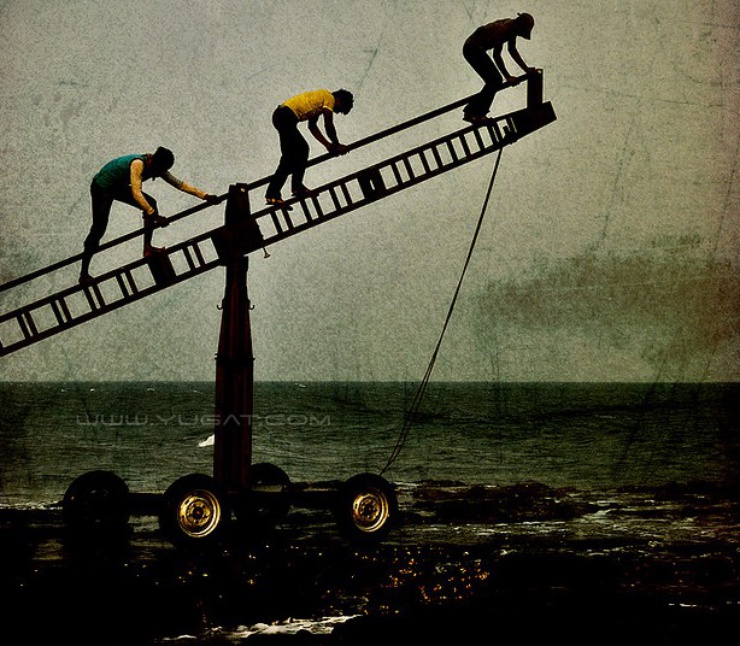
What EU young citizens would take on Noah's Ark post 2012-apocalypse
Published on
Translation by:
Cafebabel ENG (NS)The world ends on 21 December 2012 (as the Mayan calendar decided) and we're left with only a few places on the biblical boat, a chance to create a new society two by two. So what are the objects and who are the companions we'd most take on board with us after doomsday? Members of cafebabel.com's pan-European network share all
In the 2009 film 2012, German director Roland Emmerich has his characters paying extortionate amounts to be able to board Noah's Ark. The notion of human survival is to embrace the idea of corruption and lottery numbers to be safe from disaster. Presumably it would be the sheikhs, rich Russians and Scandinavian pensioners to amongst the first to battle for a seat on the ship.
With the rising unemployment rate in EU, you'd be hard put to find one of us European common citizens up there. We'd most likely be hitch-hiking our way out of the scenario. Resigned to our fate, our lost generation would otherwise bargain for a place on the boat, hinting that we could help reconstruct a new society from nothing in the post-apolyptic desert, the day after – if only someone could bank a ticket on that.
Who or what to take?
In a poll across cafebabel.com's European network, surprisingly nobody mentioned that they would take their smartphones, e-readers or coffee machines with them to the new world (although some Italians did protest the latter). So there would be no space in the future for toys from the post-industrial consumerist society. There is only room for their ideas and concepts in their hand luggage; perhaps our vision of things is a tad too serious.

Fernando from Spain would stuff his grand piano in a bulky rucksack: 'It's the most amazing, beautiful and sophisticated object ever invented by a European mind, in comparison to today's iMacs and the hungry and foolish parameters having such objects enforces,' he says. 'It is an object that has been able to make millions of souls dream around the world.' Natalia from Poland has the 25-year-old erasmus programme in her pocket, a fine memory of her last year on earth, and a token of something which nearly died its own death before the apocalypse. Aca from Serbia would be clasping the data from CERN, whilst Cristina from Spain has jammed a guide to starting a revolution in her back pocket: 'I find the idea of revolution to be a truly European heritage. Maybe in this new dimension after the end of the world we will find a status quo we want to reverse.' Elina from Greece takes a while to reply. 'Let 's see what is Europe and is not Asia, America, Oceania or Africa. Europe and European countries have a common bond on political science, philosophy and science itself. I would take a manual of political science or philosophy. The one can give birth to the other. A manual can inspire thinking - and what is Europe without this spirit!'
Millenial mileage
The ground started moving behind European feet quite some time ago now. Through the unintelligible cacophony we hear non-stop talk of an enemy financial EU summit now moved to 2013, after the world would have ended already. The financial crisis might have wrecked much in its pathway, but it's allowed the birth of innovative and creative ideas too.

Giacomo says he is simply tired. The Italian took a low-cost flight to return the cheapest way possible back to his home city from France, where he is an expat. But he'll join us on Noah's European ark. In this brand new society that is coming, he and his girlfriend claim that they do not want to hear about the 'mountains of debts or rise and rise in the employment rate or the peaks in economic growth' – the tsunami has come to blow that knowledge out of their brains. 'We want a new humanist elite to emrge, who talk endlessly after endless feasts.' Soili from Finland feels the same and counts herself in on the last part of that plan; she is coming equipped with a vineyard; 'We Europeans need it on the other side.'
Our notions of culture in these bitter and mercantile times are centered on the theatres, museums and galleries around us which are being attacked in the crisis. So why is it then that the passengers we poll are more interested in taking a CD or book with them on their way out of the world? Soili from Finland and Alexandra from Ukraine say they would pick a masterpiece from every European country. 'I would want everyone to pick a compilation of writings by two fellow countrypersons, one female and one male, to take with them,' adds Alexandra. 'I can't imagine a European society without the vast cultural treasure that is its literature. For me, as a Ukrainian, the books would be Lesya Ukrainka (Леся Українка) and Nikolai Gogol (Николай Гоголь).' Emmanuel from France agrees. 'Literature is perhaps the only thing which keeps us close to one another. Jorge Semprun had to read books in a language different from the ones they were originally written in, because of his perpetual travels; I mean being imprisoned in Buchenwald and everything...'
Annie from Scotland would bring a storyteller for company. 'Stories provide everything you need on a boat, and in life,' she says. 'Stories are lifelines, helping us to understand and come to terms with the world, even with the worst situations. Stories are compasses, pointing us towards paths which we might not have noticed. Stories are the light from a lighthouse, promising hope, signalling danger. When we have lost everything we know and love, it is stories which will help us to remember those things, to cherish their memories. But it is also stories which give us the courage and creativity to cope with the dangers and conflicts we are going to face. And, equally importantly, at least if there is a storyteller on board, you know you're not going to get bored on the boat.
What stays and what goes
None of the books that people have suggested bringing with them have had any religious symbolism. Luc from the Netherlands want tolerance to reign: 'I wish in the future we could treat diversity as a gift, as a tool, rather than a burden.' Falk from Germany agrees with widening the parameters, including: 'Thinking bigger than is needed, having intercultural competences, tolerance, conscience and an open mind.' There is no need for a bible, koran or torah to take for the apocalyptic journey, although they punctuated the history of Europe in various polemics through the ages. Tolerance first it is then! (With the exception of Sergio from Luxembourg, who would take a machine-gun on board to protect himself from savages.)

Sebastien from France would bring Swedish footballer Zlatan Ibrahimovic on board. 'The sons of Zlatan can build a boat better than Noah. And maybe a society too. We will call it the Zlatan & sons society.' Helene would bring the Irish-German actor Michael Fassbender to help repopulate the future new society, which seems to be left with a group of poor, drunk philosophers with their political manuals, European literature and multilingual tolerance. Just without the flatscreens, unemployment counts or fast food perks of the old world. Maybe this Ark is an indication of how we could live the future (without machine-guns), just in case we're all still around and kicking on 22 December.
Images: main (cc)Alex E. Proimos; in-text ark (cc) h.koppdelaney; world view (cc) Brendon Burton; team (cc) yug_and_her/ all via flickr
Translated from Per Anhalter durch die Apokalypse: Die Arche Europa



